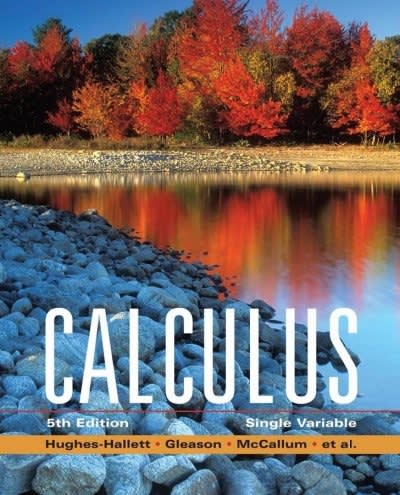Question
What is wrong with the argument claiming to prove the following assertion. You should not only find the error, but explain why it is an
What is wrong with the argument claiming to prove the following assertion. You should not only find the error, but explain why it is an error providing an example. Assertion: For any two numbers and define max(, ) to be the largest of or . If f and g are continuous at z then so is the function max(f, g) defined by max(f, g)(x) = max(f(x), g(x)). Proof: According to Definition 2.4.1 it must be shown that limxz max(f, g)(x) = max(f, g)(z). According to Definition 2.2.1, in order to show this, it must be shown that for every > 0 there is some > 0 such that | max(f, g)(x) max(f, g)(z)| < whenever 0 < |z x| < . So let > 0 be arbitrary. By the definition of max(f, g)(z) = max(f(z), g(z)) it must be the case that either max(f, g)(z) = f(z) or max(f, g)(z) = g(z).Only the first case will be considered since the argument in the second case is identical. If max(f, g)(z) = f(z) (1) then there must be some non-empty interval (z p, z + p) such that max(f, g)(x) = f(x) (2) for all x such that z p < x < z +p. Since f is continuous at z it follows by Definition 2.4.1 that limxz f(x) = f(z) and by Definition 2.2.1 that there is some > 0 such that |f(x) f(z)| < (3) whenever 0 < |x z| < . Now let be the minimum of and p. Then if 0 < |x z| < it follows that z p < x < z + p and so from (1) that max(f, g)(x) = f(x). But also 0 < |x z| < and so it follows from (3) that |f(x) f(z)| < . Combining (1), (2) and (3) yields that | max(f, g)(x) max(f, g)(z)| < as required
Step by Step Solution
There are 3 Steps involved in it
Step: 1

Get Instant Access to Expert-Tailored Solutions
See step-by-step solutions with expert insights and AI powered tools for academic success
Step: 2

Step: 3

Ace Your Homework with AI
Get the answers you need in no time with our AI-driven, step-by-step assistance
Get Started


